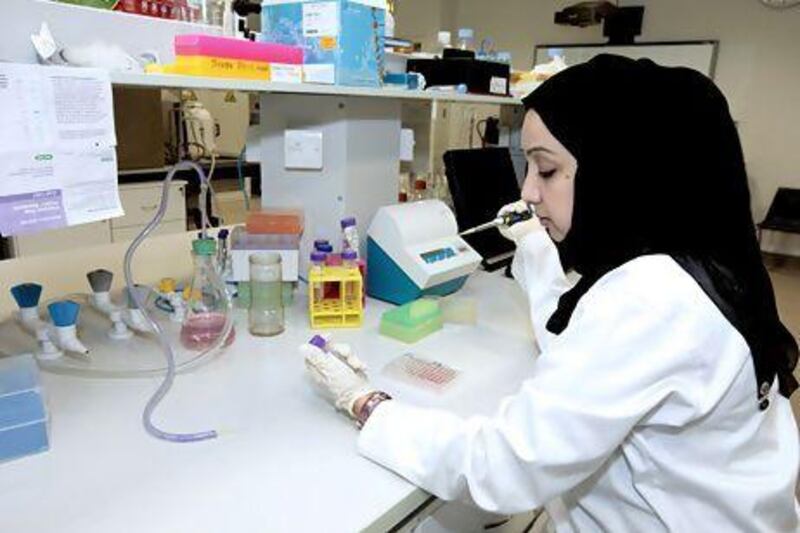Since before recorded history, man has used plant extracts to treat everything from headaches to intestinal disorders.
Even now, countless medicines – treating conditions from dry skin to cancer – contain active ingredients derived from plants.
Alkaloids, discovered in Catharanthus roseus, also known as the Madagascar periwinkle, are used to treat various forms of leukaemia. Vincristine, the compound extracted from this plant, is credited with improving survival rates among children with the condition.
Now, scientists in Al Ain have discovered a new plant-derived substance that they hope could become an addition to the anti-cancer armoury.
In a paper recently published in the journal PLoS One and reported on in The National last week, they found that an extract from the herb marjoram (Origanum majorana), was effective in killing breast cancer cells in the laboratory.
The study used a line of cells from what is known as “triple negative” breast cancer. In these types of breast cancers, which account for about a fifth of all diagnoses, the cancer cells do not express genes for certain types of hormone receptors and other substances.
They can be particularly aggressive, and the hormone therapies used for other types of breast cancer often do not work because of a lack of proper receptors, making them hard to treat. Radiotherapy and chemotherapy are still effective, though.
The UAE University researchers applied increasing concentrations of the extract for varying time periods and found that it could stop colonies of the breast cancer cells from growing by inhibiting cell division.
Much of the work was carried out by Yusra Al Dhaheri, an Emirati born and raised in the city who is studying for her doctorate at UAEU after completing her bachelor’s and master’s degrees there.
“We tested whether the cells were dying by observing, taking pictures and using chemical tests. We ended up with a graph of the percentage viability [of cells] against concentration,” she said.
At high concentrations in particular, the drug caused “massive” apoptosis – a type of programmed cell death sometimes described as cell suicide – by activating a substance known as tumour necrosis factor.
That graph clearly shows how effective the extracts were at destroying the cancer cells, with fewer than 10 per cent of them remaining alive 48 hours after being exposed to high concentrations of marjoram extract.
“This extract definitely shows promise, not only against breast cancer, but also against other types of cancer,” said Dr Rabah Iratni, the associate professor of biology at UAEU who headed the research team.
The next step for the team is to find out exactly which chemicals in the extract are causing this dramatic effect.
“We know these have anti-cancer effects, but we need to purify these from Origanum,” said Ms Al Dhaheri.
Scientists at UAEU’s chemistry department are now at work doing this purification. But financial issues could get in the way.
“This step is time and money-consuming and my research funds are limited for the time being. I hope in the near future to get more funds to carry this on and to characterise the anti-cancer compound or compounds in the extract,” said Dr Iratni.
In unpublished research, the team found that the marjoram extract can also treat other types of cancer.
Many other research projects around the world are trying to identify plant extracts that could be used to target cancer cells.
The effectiveness of plant extracts in a wide variety of medicines is often highlighted by conservationists who argue that the loss of biodiversity could lead to potential future treatments being lost for ever
Last year, researchers at Aston University in the United Kingdom reported that extracts from a plant commonly found in Pakistan, Fagonia cretica, could kill breast cancer cells without harming normal cells.
Like the scientists in Al Ain, they are now trying to discover which substances from the plant, which is used to make herbal tea, are the ones that kill the cancer cells, with a goal of ultimately trialing them as potential treatments.
Still, any lab results need to be treated with caution, as they do not always translate into an effective treatment.
That has been the case with European mistletoe, for example. Experiments indicated it might be effective in combating cancer, but the American Cancer Society has reported that these findings have not been translated into results in clinical trials, with no clear evidence as yet that the lives of cancer patients can be prolonged.
Instead, a German regulatory agency has approved the use of extracts from European mistletoe, administered by injection, for alleviating cancer symptoms.
The issue of laboratory results not always being reliable indicators of clinical effectiveness is one that Dr Emma Smith, a senior science information officer at Cancer Research UK, emphasises when considering the UAEU study.
“This early research, which suggests that extracts from the herb marjoram may stop the growth of certain types of breast cancer cells, was only carried out on cells grown in a laboratory,” she said. “This means there’s no evidence yet that it would be safe or effective as a treatment.”
The results also do not indicate, she added, that eating large amounts of marjoram could reduce the risk of developing breast cancer or could be beneficial to people with the condition.
Dr Iratni acknowledged the research was still at “the beginning of the road”, but he is hopeful that ultimately it could lead to better treatments.
“Further investigations are needed to fully characterise the extract before taking it to further steps for use on patients with cancer,” he said. “To be realistic, we are still years away from that.
“However, my lab is putting countless time and effort towards achieving this goal.”







